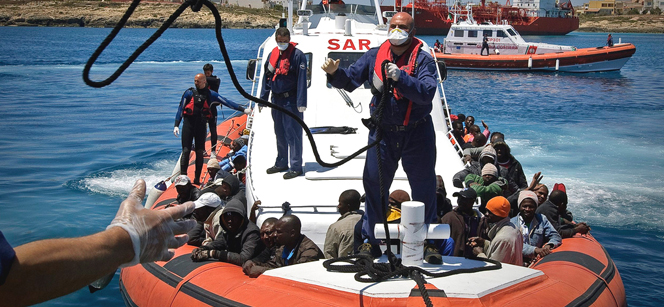


Accessibility tools
Service tools
Language selector
Navigation path
Left navigation
Additional tools
1 January 2012.
Published in El Mundo (ES), Tagesspiegel (DE), Politiken (DK), Avvenire (IT), Guardian (UK), Dagens Industri (SE) and others

Europe must widen its perspective and ensure that a common asylum system is finally put into place. Xenophobic parties cannot be allowed to dictate the agenda.
2011 was the year when European promises of solidarity with people in need were tested. It is worrying to note that Europe, collectively, did not pass the test. Now, all member states of the EU must take responsibility and make sure that 2012 will a better year for asylum matters.
Two events in the past twelve months stand out as having profound, world-altering consequences. First of all, the deepening economic crisis, which in turn became a crisis of confidence in our leaders and in Europe's capacity to find common solutions. Secondly, the Arab spring. In Tunis, Cairo and beyond, citizens rose up to fight for liberty, democracy and human rights, throwing decades-old assumptions about their societies overboard along with their oppressors.
From a European perspective, these two events are inexorably linked. As the economic crisis kept the European Union looking inward this year, unrest in Northern Africa and elsewhere has forced many to leave their homes. So – can Europe stay committed to helping those in need of shelter, while handling its own crisis?
The numbers at hand to answer that question give cause for concern. In the first half of 2011, over 75 percent of all asylum applications were made in only six EU member states. That leaves a long row of European countries that can and must do more. And as over 700.000 people were forced to flee the violence in Libya, many ended up in refugee camps in neighbouring countries. Of the 8000 people identified by the UN as being in particular need of help, all EU member states only managed to promise to receive 400. Norway, a non EU-country, accepted nearly as many by itself.
Meanwhile, more than fifty thousand migrants crossed the Mediterranean in rickety vessels to the EU. Far too many died trying. Others arrived at the Italian island of Lampedusa and to Malta, and at a pledging conference last spring, European countries had the chance to show their solidarity. The result? A mere 300 refugees being relocated from Malta to other member states.
Only last month, the world convened in Geneva for a ministerial conference on refugee issues – the biggest gathering ever of its kind. For a full year preceding the event, the UN refugee agency called on all countries to come to Geneva with pledges to accept refugees. The bid from the EU came to zero, as member states were unable to agree on a joint pledge.
An underlying problem is the political mood in many member states. We have not seen as many populist and xenophobic parties in European national parliaments since before World War II. True to form, they exploit the current crisis, trying to shift the blame from poorly-managed national economies to immigrant populations. Here, we need European and national leadership to make sure that populist logic does not dictate the agenda.
Because contrary to what the xenophobes would have us believe, the number of asylum seekers in Europe is far lower today than it was ten years ago. And Europe is by no means exceptionally open in its asylum policies. There are far more refugees in Kenya alone than there are in the 27 EU countries.
However, unforeseen events like the Arab spring can over-stretch the asylum capacity of any country, and Europe has to be prepared to support such member states so that the people who arrive here are received in dignity.
Despite common minimum rules, several countries' asylum systems do not function well enough, leading to unacceptable reception conditions for migrants. And those seeking asylum face severe uncertainty as standards in granting refugee status differ greatly between countries. Such disparities are not acceptable in a European Union where we have signed the same international conventions and unite around the same values. The EU needs common high standards and stronger cooperation to ensure that asylum seekers are treated equally in an open and fair system – wherever they apply.
That is why the EU has been inching towards a common asylum policy for over a decade, and has set the deadline to 2012 for putting the common system into place. Some positive steps were taken in 2011, but negotiations between member states are still too slow-moving. Now, we brace ourselves for the new year, when those talks need to be significantly intensified.
I am convinced that we are perfectly capable of dealing with our economic difficulties while staying true to our ideals of openness, tolerance and solidarity. Our commitment cannot be a zero-sum game. This year, Europe must widen its perspective and ensure that the common asylum system is finally put into place.